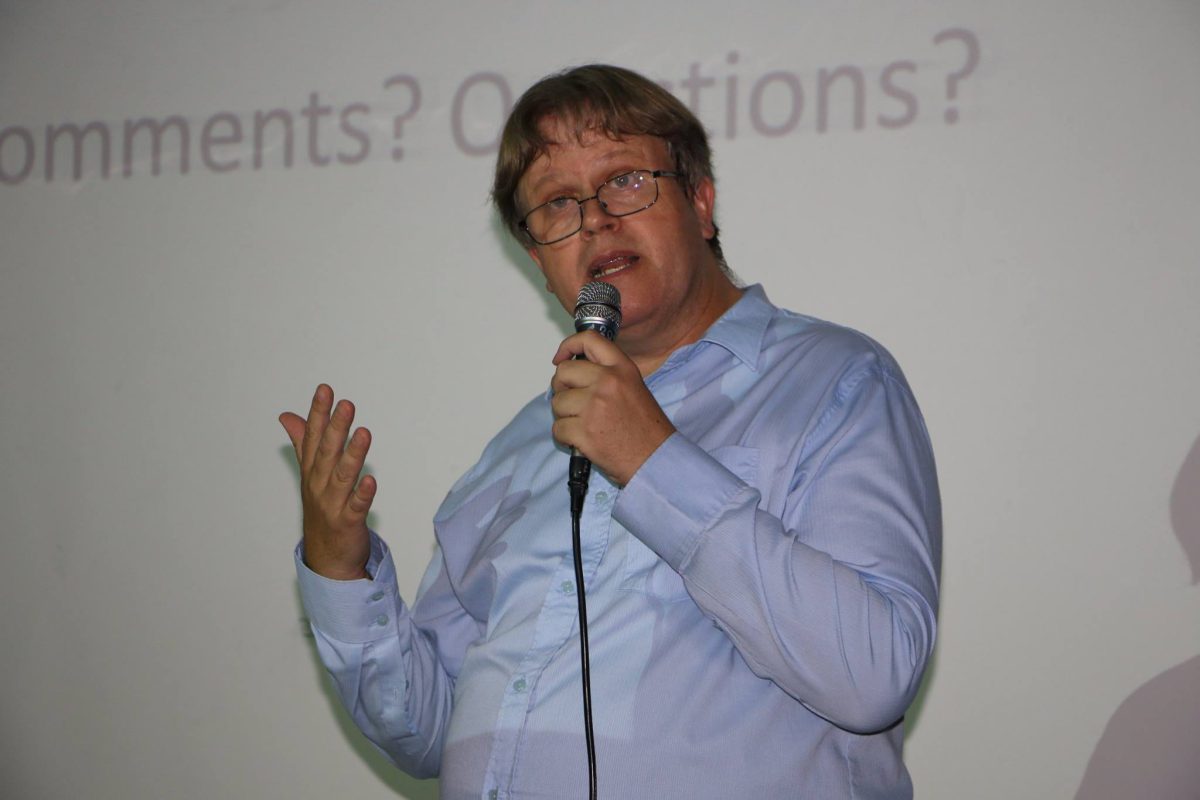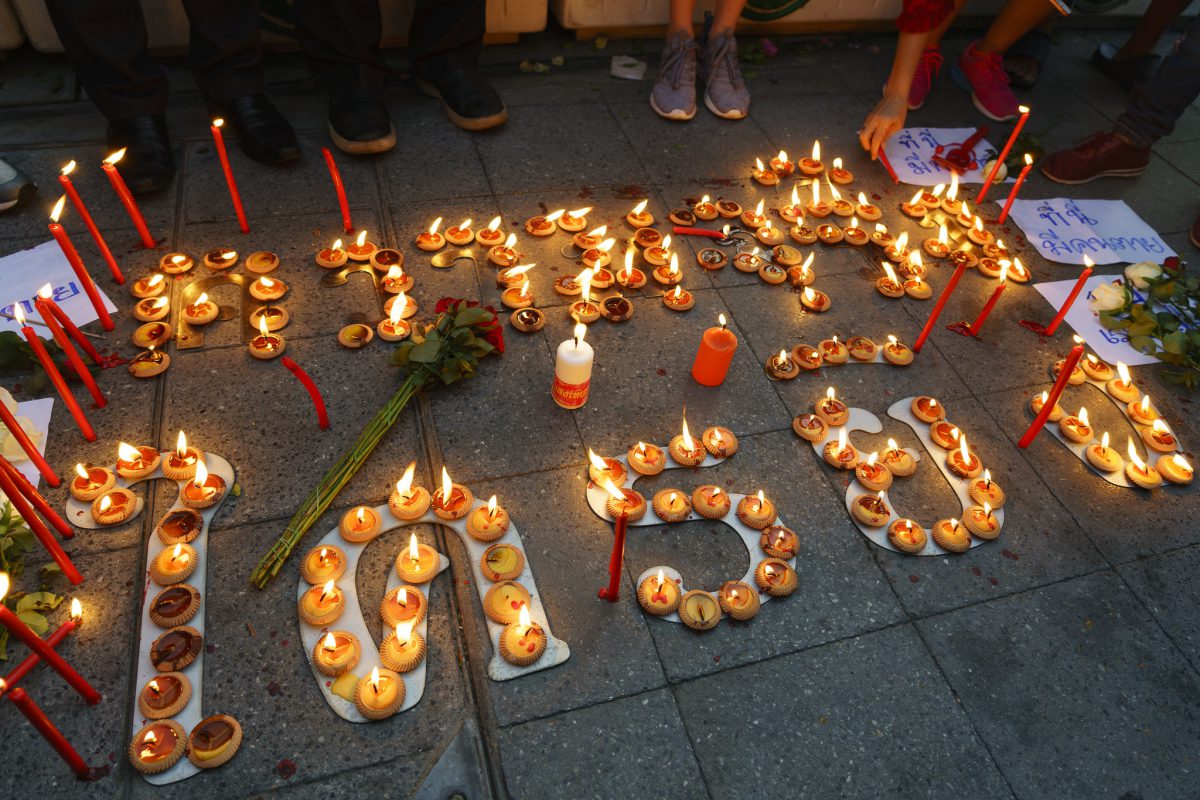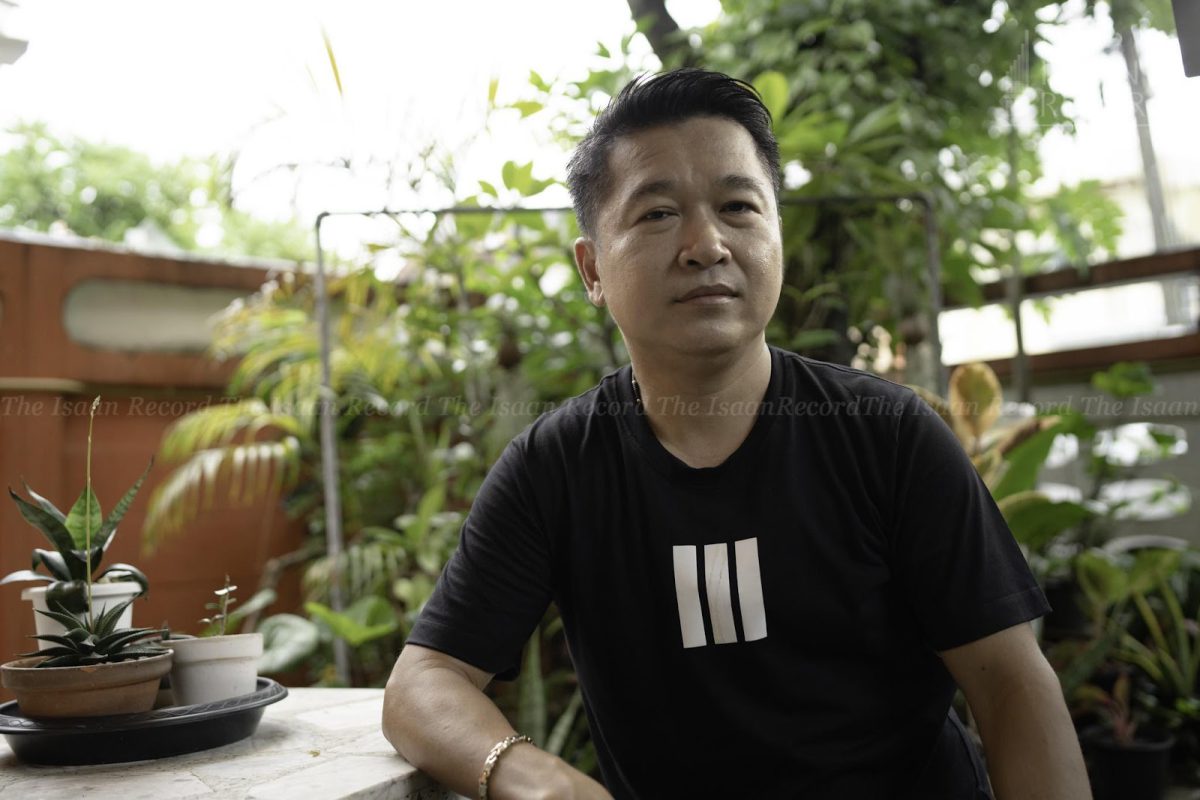
Over the past year, pro-democracy movements among the young generation have blossomed across the kingdom. The originally forceful campaign however has been curbed with constant arrests, intimidation, and violence. Despite facing such threats, one teen in Udon Thani remains unflinching, and turns to performance art to challenge the state’s attempt at oppression
By Oranipha Sunarong, Citizen Reporter
Since last year, Thailand has seen political rallies held by the young generation growing across the kingdom.
Seventeen-year-old Pimmada is one of the teenagers turning up on the street to exercise their right to freedom of expression. As a result, she has been accused of being “a threat to state security” and has faced intimidation by the authorities.
She has continued to show her defiance by turning to performance art. On September 17, she organized a political play before a number of spectators in front of the Udon Thani Provincial Juvenile and Family Court.
In an interview with Oranipha Sunarong, an Isaan Record Citizen Reporter, Pimmada reveals the motivation behind her activism, and the message she wants to convey to the public through her performance.
……
Isaan Record Citizen Reporter Oranipha Sunarong: Why did you decide to get involved in political activism?
Pimmada: I grew up with it. In my family, there are civil servants, soldiers, and local politicians. Several members of my family work in local politics. I’ve seen how politics works from a very young age. Before I started my own activism, I’d followed the news and I criticized the government. It wasn’t until the Future Forward Party was dissolved and student flash mobs began to appear that I went out on the street and actively joined the movement.
IRCR Oranipha: To join political rallies these days, many people have been arrested, intimidated, or even injured. Haven’t you been scared?
Pimmada: No, others might have been scared for certain personal reasons. My family also has its own reasons. However, I feel like being arrested, intimidated or injured is inevitable if the government is authoritarian. During the NCPO era , people were taken in to get “attitude adjustments.” So, I’m not scared. [The National Council for Peace and Order is the military group that seized power in 2014. –ed.]
IRCR Oranipha: How have you been intimidated by the authorities?
Pimmada: During my year of activism, I have been intimidated by the authorities once, as far as I know. That day, I went to another province to run some errands. Then, someone at home called and said 4-5 police and security officers came by and took photos of our house. But it happened that no one was at home when they came. So, I didn’t feel a big impact from that. Then they went to the village chief, asking him to tell my family to stop me from protesting. They said I was a threat to the institution. [“The institution” refers to the monarchy –ed.]
IRCR Oranipha: Did you feel pressured? How have you coped with that?
Pimmada: I don’t feel pressured now, but initially I felt some. Like I said before, an authoritarian regime can do anything to us. I started my involvement in the movement when I was in the 10th grade. I think I felt pressured then because I was young, but more than the intimidation from the state was the pressure from my family. The government threatened not only me but also my family. I tried to have a conversation with them to make them become more understanding.
IRCR Oranipha: How has the intimidation affected you and your family?
Pimmada: When it happened, I fought with my family, until they cut my allowance and kicked me out of home. I didn’t go home for months. Before I became politically active, we didn’t really share the same political views to begin with, but it was still okay at home. After those officers came to our place, my family began doing things that I felt were very harsh towards me. I couldn’t do anything.
Cutting my allowance and kicking me out of home took a huge toll on my mental wellbeing. But I’m back living at home now, because I showed them that no matter how hard they tried, I wouldn’t stop protesting and voicing my opinions.

IRCR Oranipha: What do your teachers feel about your activism? Do your classmates think of you as strange?
Pimmada: Many teachers agree with me, but some don’t. I’ve gotten some backlash from those who don’t agree with me as well. After being a moderator at a rally, one of the head teachers tried to find me out, asking if anyone knew who this person was. She wanted to see my face. She tried to ask many people close to me but didn’t get much information. People who know me didn’t really reveal anything to her. My classmates have always been supportive. When I join political activities, I invite them all the time. No one thinks it’s strange.

IRCR Oranipha: What is the message you want to pass on through this performance?
Pimmada: I’d like to say that I’m an underaged citizen who has been intimidated by the government. They try to force me in every possible way, like tying me up or telling me to prostrate before a picture frame. I’d like the audience to be able to think about it afterwards because the performance is open to very broad interpretations. I’d like them to see and then ponder over my act. I must thank the Isaan activist who granted me permission to do the performance as I was inspired for “being tied up” by her act.
IRCR Oranipha: Where did you learn how to perform?
Pimmada: I’ve never taken an acting class but I love seeing performance art. I love art, so I recalled what I had seen and adapted it to my own performance. That performance on Sept 17 was the first time I had ever acted in front of so many people. My head was pushed down. Paint was thrown at me. It’s the kind of acting I wanted to do for a very long time, and I wanted the performance to be easy to understand for anyone.
IRCR Oranipha: What do you think of the notion that “politics is no child’s business”?
Pimmada: I don’t agree with it but once this discourse began to be expressed, another one followed. People started saying, “politics is everyone’s business.” I agree with the latter because everything surrounding us is politics. Even from the moment you are born or conceived in a womb, you’re surrounded by politics. Sometimes the government and other people try to make us think politics is something so distant from our personal affairs, but really it’s not. It’s closer to you than you think.
I very much disagree with people saying politics is no child’s business. I feel like it’s prejudging children only by their age, and it’s suppressive. Many children are very independent and mature. They can do many things people don’t even expect them to be able to do. I think the idea is very discriminatory against children.
IRCR Oranipha: How is the political movement among the young generation in Udon going now?
Pimmada: It’s not particularly good or bad. People have started pushing the boundaries even further. The movement in the province has always been quite promising. Many times when we organized a rally we saw so many people joining, many more than we expected. There wasn’t really anything that promoted our cause, but many people joined. Vendors also joined us because they have been affected by COVID-19. They weren’t able to sell anything. The economy tanked.
IRCR Oranipha: As a teenager intimidated by the government, what is your dream society?
Pimmada: I was asked that question once when I first started my activism. Back then, I answered that I wanted a better life, a life in which I didn’t have to worry about any dangers when I went outside. I still want the same thing, but now I also want true equality for our society, and I want everyone to be empathetic. Now, many issues occur because people don’t try to understand each other. I want people to be more accepting. I also want a good state welfare system. I believe that if we can achieve structural change and receive good welfare, there will be fewer and fewer people left behind.
IRCR Oranipha: If that dream society came to be, would you still continue your activism?
Pimmada: I would keep it going, I think. If I stop, then I don’t know who else will do it. I might have a small voice, but if many small voices come together, they can become loud and clear.




